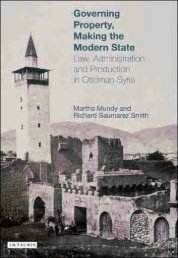The Young Turk Period, 1908-1918 - PSI424
The Young Turk Period, 1908-1918 - PSI424
The Young Turk Period, 1908-1918 - PSI424
You also want an ePaper? Increase the reach of your titles
YUMPU automatically turns print PDFs into web optimized ePapers that Google loves.
278 <strong>The</strong> Rise of Modern <strong>Turk</strong>ey, 1808-1975<br />
from the Greek government, the Dashnaks, and even the patriarch in return for its<br />
support of minority aspirations. <strong>The</strong> Greek ambassador declared that there were<br />
6.5 million Greeks in the empire and demanded that they be given one quarter of<br />
all the seats in the new assembly and that Greek be made an official language. <strong>The</strong><br />
Dashnaks made similar demands for the Armenians. In reaction the Muslims turned<br />
more and more to Islamic and <strong>Turk</strong>ish views, though since the latter had no<br />
candidates the CUP prevailed, winning all the 288 deputy seats but one, which went<br />
to the Liberal Union. <strong>The</strong> <strong>Turk</strong>s gained a bare majority, with 147 seats, while<br />
60 seats went to the Arabs, 27 to Albanians, 26 to Greeks, 14 to Armenians, 10 to<br />
Slavs, and 4 to Jews. 9 <strong>The</strong> voting had been honest, all the millets were represented<br />
in proportion to their actual population, and it seemed possible at least that<br />
democracy in the empire might well be given a second chance. <strong>The</strong> upper house,<br />
or Chamber of Notables (Meclis-i Ay an), was soon appointed by the Council of<br />
Ministers, and the Parliament and government seemed fully prepared for the new<br />
Ottoman constitutional regime.<br />
On December 17, <strong>1908</strong>, the old city of Istanbul witnessed one of the most remarkable<br />
scenes in its long history. Sultan Abdulhamit drove through the narrow streets<br />
in an open carriage, waving to the crowds assembled as he went to open the new<br />
Parliament, assembled in the Ministry of Justice building behind the Aya Sofya<br />
mosque. With his first secretary reading his speech, the sultan explained why he<br />
had not recalled the Parliament since 1878, stating that his advisers had recommended<br />
postponing this part of the Constitution until the empire was ready for it,<br />
the people better educated, and the basic reforms well established. "Being satisfied<br />
that the fulfillment of this wish would promote the present and future happiness of<br />
my Empire and Country, I proclaimed the Constitution anew without hesitation in<br />
spite of those who hold views and opinions opposed to this," he explained. 10 In<br />
response, both councils praised the sultan for restoring the Constitution and criticized<br />
those of his advisers who had misguided him in the past. <strong>The</strong>n they went on<br />
record to support the government's efforts to regain the recently lost territories. 11<br />
But the new regime had little chance of success. <strong>The</strong> Parliament simply helped<br />
focus attention on the divisions and rivalries that had been momentarily extinguished.<br />
<strong>The</strong> minority delegates did what they could to paralyze action until their<br />
demands were granted. <strong>The</strong> Muslim delegates and ministers were divided on<br />
whether to follow the CUP or the sultan or to develop an independent policy. Endless<br />
debates soon stalled most of the laws prepared by the Council of State. After<br />
he saw how unsuccessful the Porte had been in countering foreign aggression and<br />
how ineffective the Parliament was in facilitating the passage of legislation,<br />
Abdulhamit did not hesitate to intervene. <strong>The</strong> supporters of Islamism began to<br />
agitate openly, possibly but not definitely with the support of the sultan. Reacting<br />
to the secularism of the Constitution, the appearance of unveiled women on the<br />
streets, and the new equality recognized for non-Muslims, the Muslim religious<br />
conservatives began to campaign openly against the Constitution, declaring that the<br />
empire's decline had been caused by its departure from basic Islamic foundations<br />
and that Islam could be adapted to meet the demands of a modern age; Islam could<br />
provide the laws to regulate every aspect of the empire's social and political life,<br />
while only the technology of the West need be borrowed. Sympathizers were found<br />
everywhere, not only among the ulema, but also in the bureaucracy and the army,<br />
the dervish orders, and among the masses. <strong>The</strong> attempts of the new government to<br />
make provincial government more efficient and to conscript everyone also irritated<br />
the tribes of eastern Anatolia, which had always insisted on autonomy. Leading the












